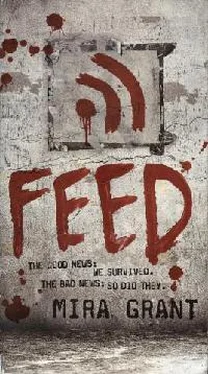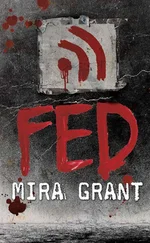“I’ll get to work,” said Shaun, and stood as I did, exiting the van a few steps ahead of me. He didn’t stop or look back as I came out; he just kept going. Shaun knows me better than anyone else in the world. Sometimes I think he knows me better than I do. He knows I need a few minutes by myself before I can start working. Location doesn’t matter. Just solitude.
The afternoon light had dimmed without dying, and my bike wasn’t quite as painful to look at. I walked over and leaned against it, resting my heels on the driveway as I closed my eyes and tilted my face up into the dying light. Welcome to the world, kids. Things were moving now, and all we could do was make sure that the truth kept getting out, and getting where it needed to be.
When I was sixteen and told my father that I wanted to be a Newsie—it wasn’t a surprise by that point, but it was the first time I had said it to his face—he pulled some strings and got me enrolled in a history of journalism course at the university. Edward R. Murrow, Walter Cronkite, Hunter S. Thompson, Cameron Crowe… I met the greats the way you should meet them, through their words and the things they did, when I was still young enough to fall in love without reservations or conditions. I never wanted to be Lois Lane, girl reporter, even though I dressed like her for Halloween one year. I wanted to be Edward R. Murrow, facing down corruption in the government. I wanted to be Hunter S. Thompson, ripping the skin off the world. I wanted the truth, and I wanted the news, and I’d be damned before I settled for anything less.
Shaun’s the same, even if his priorities are different. He’s willing to let a good story come before the facts, as long as the essential morals stay true. That’s why he’s so good at what he does, and why I double-check every report he writes before I release it.
One thing I did learn from those classes is that the world is not, in any way, what people expected thirty years ago. The zombies are here, and they’re not going away, but they’re not the story . They were, for one hot, horrible summer at the beginning of the century, but now they’re just another piece of the way things work. They did their part: They changed everything. Absolutely everything.
The world cheered when Dr. Alexander Kellis announced his cure for the common cold. I’ve never had a cold, thanks to Dr. Kellis, but I understand they were pretty annoying; people didn’t enjoy spending half their time sniffling, sneezing, and getting coughed on by total strangers. Dr. Kellis and his team rushed through testing at a pace that seems criminal in retrospect, but who am I to judge? I wasn’t there.
What’s really funny is that you can blame this whole thing on the news. One reporter heard a rumor that Dr. Kellis was intending to sell his cure to the highest bidder and would never allow it to be released to the man on the street. This was ridiculous if you understood that the cure was a modified rhinovirus, based on the exact virulence that enabled the common cold to spread so far and so fast. Once it got outside the lab, it was going to “infect” the world, and no amount of money would prevent that.
Those are the facts, but this guy didn’t care about the facts. He cared about the scoop and being the first to report a great and imaginary injustice being perpetrated by the heartless medical community. If you ask me, the real injustice is that Dr. Alexander Kellis is viewed as responsible for the near-destruction of mankind and not Robert Stalnaker, investigative reporter for the New York Times . If you’re going to lay blame for what happened, that’s where it belongs. I’ve read his articles. They were pretty stirring stuff, condemning Dr. Kellis and the medical community for allowing this to happen. Mankind, he said, had a right to the cure.
Some people believed him a bit too much. They broke into the lab, stole the cure, and released it from a crop duster, if you can believe that. They flew that bastard as high as it would go, loaded balloons with samples of Dr. Kellis’s work, and fired them into the atmosphere. It was a beautiful act of bioterrorism, conducted with all the best ideals at heart. They acted on a flawed assumption taken from an incomplete truth, and they screwed us all.
To be fair, they might not have screwed things up as badly as they did if it hadn’t been for a team working out of Denver, Colorado, where they were running trials on a genetically engineered filovirus called “Marburg EX19,” or, more commonly, “Marburg Amberlee.” It was named for their first successful infection, Amanda Amberlee, age twelve and a half. She’d been dying of leukemia and considered unlikely to see her thirteenth birthday. The year Dr. Kellis discovered his cure, Amanda was eighteen, finishing her senior year of high school, and perfectly healthy. The folks in Denver took a killer, made a few changes to its instructions, and cured cancer.
Marburg Amberlee was a miracle, just like the Kellis cure, and together they were primed to change the course of the human race. Together, that’s what they did. No one gets cancer or colds anymore. The only issue is the walking dead.
There were ninety-seven people in the world infected with Marburg Amberlee when the Kellis cure was released. The virus never left the system once it had been introduced; it would kill off cancerous cells and go dormant, waiting. All those people were quiet, noninfectious hot zones, living their lives without a clue of what was about to happen. Amanda Amberlee wasn’t among them. She died two months earlier, in a car crash following her senior prom. She was the only one of the Marburg Amberlee test cases not to reanimate; she provided the first clue that it was the interaction of the viruses and not Marburg Amberlee itself that caused the apparently dead to rise.
The Kellis cure swept the globe in days. Those responsible for the release were hailed, if not as heroes, then at least as responsible citizens, cutting through red tape to better the lives of their fellow men. No one knows when the first Marburg Amberlee test subjects came into contact with the cure or how long it took from exposure to mutation. How long for the formerly peaceful filovirus to seize on the newly introduced rhinovirus and begin to change? Best estimates say that within a week of the introduction of the Kellis cure to Marburg Amberlee, the two had combined, creating the airborne filovirus we know as Kellis-Amberlee. It went on to infect the world, hopping from person to person on the back of the virulence coded into the original Kellis cure.
There is no index case for viral amplification. It happened in too many places at the same time. We can only pinpoint things to this degree because of what the movies got wrong: Infection wasn’t initially universal. People who died before getting dosed with Kellis-Amberlee stayed dead. Those who died after infection didn’t. Why it brings its hosts back to literal, biological life is anyone’s guess. The best theories hold that it’s an enhanced version of normal filovirus behavior, the urge to replicate taken to a new and unnatural level, one that taps into the nervous system of the host and keeps it moving until it falls apart. Zombies are just sacks of virus looking for something to infect, being “driven” by Kellis-Amberlee. Maybe it’s true. Who knows? Whether it is or not, the zombies are here, and everything has changed.
That includes the shape of the political world, because a lot of the old issues shifted once the living dead were among us. The death penalty, animal cruelty, abortion—the list goes on. It’s hard to be a politician in this world, especially given the xenophobia and paranoia running rampant through most of our more well-off communities. Senator Ryman was going to have a long, hard fight to the White House, assuming he could get there at all. And we’d be with him every step of the way.
Читать дальше












